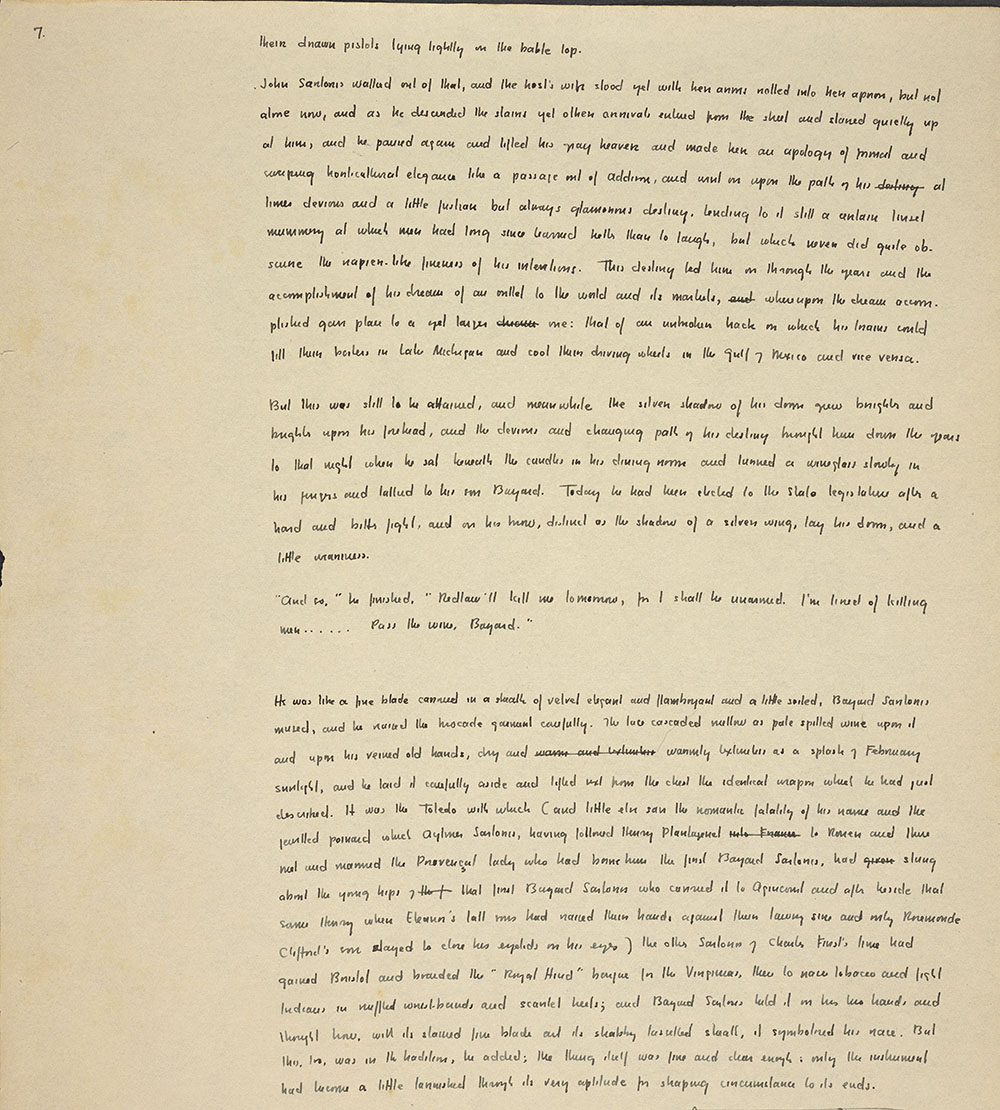TRANSCRIPTION
their drawn pistols lying lightly on the table top.
John Sartoris walked out of that, and the host's wife stood yet with her arms rolled into her apron, but not
alone now, and as he descended the stairs yet other arrivals entered from the street and stared quietly up
at him, and he paused again and lifted his gray beaver and made her an apology of formal and
sweeping horticultural elegance, like a passage out of Addison, and went on upon the path of his <destiny> at
times devious and a little fustian but always glamorous destiny, lending to it still a certain tinsel
mummery at which men had long since learned better than to laugh, but which never did quite ob-
scure the rapier-like fineness of his intentions. This destiny led him on through the years and the
accomplishment of his dream of an outlet to the world and its markets, <and> whereupon the dream accom-
plished gave place to a yet larger <dream> one: that of an unbroken track on which his trains could
fill their boilers in Lake Michigan and cool their driving wheels in the Gulf of Mexico and vice versa.
But this was still be be attained, and meanwhile the silver shadow of his doom grew brighter and
brighter upon his forehead, and the devious and changing path of his destiny brought him down the years
to that night when he sat beneath the candles in his dining room and turned a wineglass slowly in
his fingers and talked to his son Bayard. Today he had been elected to the State legislature after a
hard and bitter fight, and on his brow, distinct as the shadow of a silver wing, lay his doom, and a
little weariness.
"And so," he finished, "Redlaw'll kill me tomorrow, for I shall be unarmed. I'm tired of killing
men . . . . . . Pass the wine, Bayard."
He was like a fine blade carried in a sheath of velvet elegant and flamboyant and a little soiled, Bayard Sartoris
mused, and he raised the brocade garment carefully. The lace cascaded mellow as pale spilled wine upon it
and upon his veined old hands, dry and <warm and textureless> warmly textureless as a splash of February
sunlight, and he laid it carefully aside and lifted next from the chest the identical weapon which he had just
described. It was the Toledo with which (and little else save the romantic fatality of his name and the
jewelled poinard which Aylmer Sartoris, having followed Henry Plantagenet <into France> to Rouen and there
met and married the Provencal lady who had borne him the first Bayard Sartoris, had <given> slung
about the young hips of <the f> that first Bayard Sartoris who carried it to Agincourt and after beside that
same Henry when Eleanor's tall sons had raised their hands against their [tawny?] sire and only Rosemonde
Clifford's son stayed to close his eyelids on his eyes) the other Sartoris of Charles First's time had
gained Bristol and boarded the "Royal Hind" barque for the Virginias, there to raise tobacco and fight
Indians in ruffled wrist-bands and scarlet heels; and Bayard Sartoris held it in his [his?] hands and
thought how, with its stained fine blade and its shabby tasselled sheath, it symbolized his race. But
this, too, was in the traditions, he added; the thing itself was fine and clear enough: only the instrument
had become a little tarnished through its very aptitude for shaping circumstances to its ends.
|


